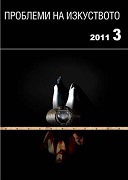Практики на филмовия превод в епохата на глобализацията
Film Translation in the Age of Globalization
Author(s): Petia AlexandrovaSubject(s): Theatre, Dance, Performing Arts
Published by: Институт за изследване на изкуствата, Българска академия на науките
Summary/Abstract: When does film translation help and when does it hamper film perception? In the beginning immediately after 1896 film translation depended on the ‘recommenders’ who as a true folklore bard stood before the cinema hall and summoned the people to enter the hall by explaining in details the film story. The next stage in the silent cinema was the captions which were shot separately and then edited into the film. That is why it was not that difficult to ‘remove’ them from the original and ‘added’ in another language when that copy had to be distributed abroad. During the 1920s the approach to the captions was like to a work of art (The Cabinet of Doctor Caligari, Metropolis, The Battleship Potemkin). After the introduction of sound the dialogue in a film was much more as screen time not to speak of its growing role as far as the story was concerned. And in the 1930s two models of film translation were established. The first one was dubbing. The positive side of this was the easy and passive perception. It did not distract the attention of watching the shot or the episode. The negative side – one never heard the original voice of the actors. The other model is subtitling. Quite a lot of negative elements can be pointed out here – the viewer perceives one shot for less time than the director has fore- seen, consequently less adequately. The great advantage of this method is the following – the audience hears the voices of the actors and absorbs the intonations, modulations, specific characteristics of their voices. In Bulgaria the subtitling model is the general practice when a film is distributed for the big screen. But the process of globalization has changed the situation: in the case of DVDs quite often there are subtitles but also dubbing and in a number of language versions. Subtitling in the English language has become a standard for the presentation of films at international festival and that includes Bulgarian films also. If a film has an English-language version it exists in the public distribution space as well as on the internet. But this only raises the requirements for a translation of the films in Bulgarian language.
Journal: Проблеми на изкуството
- Issue Year: 2011
- Issue No: 3
- Page Range: 46-47
- Page Count: 2
- Language: Bulgarian
- Content File-PDF

